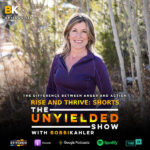The first time I saw this distinction was back when I was 15 and we were taking care of our neighbors, Mae and Bea, farm while they were on vacation for 3 weeks.
Things were going along fine and then about 10 days into their vacation, my mom, my little sister Suzette and I were out picking beans in our own garden. We heard a truck tearing up the road and into our driveway. That was unusual to say the least. Then we saw this man come running around our house towards us and he was yelling and screaming something about his cows and Mae and Bea’s bull (which apparently had decided that he wanted to get acquainted with the cows so he knocked down part of the fence). As this man got closer, he was clearly in a rage and still screaming and ranting. At this point, our dog Snuggles, who wasn’t as cuddly as his name would lead you to believe, put himself between us and this man and started barking and growling. Snugs was a good size Australian Shepherd and he was very protective.
The man stopped screaming and started staring at Snuggles. He stammered: Does this dog bite? And my mom calmly said, “I really don’t know, but it sure looks like we are about to find out doesn’t it?” At that point the man ran back to his truck and took off. When Dad got home, we were telling him about it because frankly it was a little scary. As we were telling him about it, the man showed up again, skidding into our driveway. Once again, he jumped out of his truck, yelling and screaming. He raced to our back door and started pounding on it.
This time, however, it was my dad who answered the door. Now, my dad was former Navy and he’d been a boxer in the Navy. When my dad answered the door, he didn’t say a single word and he didn’t do anything. He just calmly stood there. The man took off running for his truck.
Here’s what I still don’t understand to this day: my dad followed the man to the truck – and my dad never seemed to hurry – but he caught the man just as the man was trying to close his truck door. At this point, the man in the truck looked as though he’d rather have been facing Snuggles. And, then my Dad in a deadly calm voice said, “Let’s get one thing straight. You will never come tearing on to my property again. If you need to come on to my property, you will do so with respect. You will also never raise your voice to my wife and children again. Do you understand?” The man managed a nod. And then my dad said, “Okay then. Tell me about what’s happened and how do we go about fixing it.”
That was it. I knew that my dad was angry with this man -- and he had every right to be – BUT he never lost his temper, he didn’t yell and scream. His expression of anger was to very clearly draw a boundary of what was acceptable and what was not acceptable.
As a kid, I was completely stunned. Up until that point, I had always witnessed and assumed that when you got angry, you acted angry. It took my years to work on this. There is a fabulous book called the Dance of Anger that dives deeper into this but the essence is that anger is a completely viable and valuable emotion. It is a signal that we feel that someone has crossed a boundary or treated us unfairly or that there has been some sort of injustice or that we’ve been betrayed, etc.
When those things happen, it is healthy to feel anger. Anger is a data point. It is healthy to be able to have a conversation with the person who has somehow transgressed against you or to resolve the issue in some fashion. What isn’t healthy is when we hold onto the anger and we allow it to fester and we don’t resolve it. That’s typically when it boils over at some point and we end up expressing the anger in ways that we wished we hadn’t. So, the next time you feel anger, accept it as a data point and be curious, explore it. What caused the anger? Sometimes that’s an obvious answer and other times it isn’t. but don’t judge it. Once you identify the source then you can decide on the best course of action: do you want to confront it in some fashion or are you choosing to accept it for some reason? There are healthy reason for both. But, and this is really important, if you decide to accept it, that means you are deciding to let the anger go. If the anger continues to fester that’s a clear signal that you neither confronted it or accepted it.
Show Notes:








